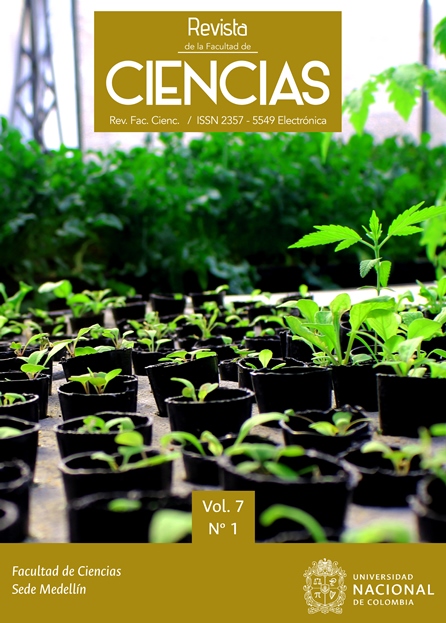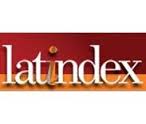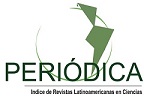La Ciencia en Latinoamérica: Tendencias y patrones
Science in Latin America: Trends and patterns
DOI:
https://doi.org/10.15446/rev.fac.cienc.v7n1.69409Keywords:
Latinoamérica, ciencia y tecnología, valoración, estado actual, indicadores de grano grueso, perspectivas de futuro (es)Coarse indicators, future challenges, Latin America, science and technology, state of the art, survey (en)
Downloads
References
Ibáñez, J. (2017). Un Universo invisible bajo nuestros pies. Recuperado de http://www.madrimasd.org/blogs/universo/
Lombardi, V. (2016). Ciencia y tecnología en América Latina. Buenos Aires, Argentina: textit{Agencia TSS. Universidad Nacional de General San Martín.} Recuperado de http://www.unsam.edu.ar/tss/la-evolucion-de-la-ciencia-en-america-latina/
Lombardi, V. (2016). Cultura científica en América Latina. Buenos Aires, Argentina: textit{Agencia TSS. Universidad Nacional de General San Martín.} Recuperado de http://www.unsam.edu.ar/tss/cultura-cientifica-en-america-latina/.
Magonia. (2006). Turquía y Estados Unidos son los dos países más antievolucionistas de Occidente. Recuperado de http://magonia.com/2006/8/15/turquia-y-estados-unidos-son-dos-paises-mas/
Rey, J.; Martín, L.; Plaza, L.; Ibáñez, J. & Méndez, I. (1998). Changes on Publishing behaviour in response to research policy guidelines. The case of the Spanish Research Council in the field of Agronomy. textit{Scientometrics,} 41(textbf{1-2}), 101-111. https://doi.org/10.1007/BF02457971.
RICYT. (2016). Red de Indicadores de Ciencia y Tecnología -Iberoamericana e Interamericana- (RICYT). textit{Organización de Estados Iberoamericanos (OEI)}. Recuperado de http://www.oei.es/historico/noticias/spip.php?article9214.
UNESCO. (2015). UNESCO Science Report: Towards 2030. Paris, France: textit{Unesco Publishing.} Retrieved from http://unesdoc.unesco.org/images/0023/002354/235406e.pdf o http://en.unesco.org/unesco$_$science$_$report.
SciDev.Net. (2017). Radar latinoamericano: ¿cuántos científicos hay que tener?. Recuperado de http://www.scidev.net/america-latina/desarrollo-de-capacidades/blog-de-analistas/radar-latinoamericano-cuantos-cientificos-hay-que-tener.html
How to Cite
APA
ACM
ACS
ABNT
Chicago
Harvard
IEEE
MLA
Turabian
Vancouver
Download Citation
CrossRef Cited-by
1. Javier Tarango, Fidel Gonzalez-Quiñones. (2021). Influencia idiomática en la producción científica de investigadores mexicanos. TECNOCIENCIA Chihuahua, 15(2), p.76. https://doi.org/10.54167/tecnociencia.v15i2.837.
2. Luisa Fernanda Echeverría-King, Jorge Pinto, María Angela Lorena Mosquera-Montoya. (2021). Inversión en actividades de ciencia, tecnología e innovación: el caso de Colombia y Ecuador. Revista CEA, 7(14), p.e1672. https://doi.org/10.22430/24223182.1672.
3. Tomás Darío Marín-Velásquez. (2022). Análisis cuantitativo de las revistas de América Latina y el Caribe indexadas en Web of Science (2021). Revista General de Información y Documentación, 32(1), p.121. https://doi.org/10.5209/rgid.82944.
4. Carlos Eduardo Daza-Orozco, Óscar Fernando Forero-Londoño, Martha Andrea Merchán-Merchán. (2024). Políticas institucionales de investigación en educación superior. Panorama, 18(34), p.14. https://doi.org/10.15765/ev9vmb63.
5. Paola Andrea Mendoza-Medina, Nicolas Arias-Bermúdez, Nelsy R. Pinto-Sánchez. (2025). Estado del arte de la ecomorfología de la familia Plethodontidae (Amphibia: Caudata) en América. Actualidades Biológicas, 74(122) https://doi.org/10.17533/udea.acbi/v47n122a03.
6. Fabio Lorensi do Canto, Adilson Luiz Pinto, Edson Mário Gavron, Marcos Talau. (2022). Latin American and Caribbean journals indexed in Google Scholar Metrics. Scientometrics, 127(2), p.763. https://doi.org/10.1007/s11192-021-04237-x.
7. Wladimir Moya , Jaime R. Rau. (2022). Productividad científica de investigadores en ciencias marinas en América Latina. Palabra Clave (La Plata), 11(2), p.e156. https://doi.org/10.24215/18539912e156.
8. Gustavo Vargas Yara, Darwin Dubay Rodriguez, Aylin Viviana Silva Ortiz. (2021). Aporte del SENA al sistema nacional de ciencia, tecnología e innovación de Colombia. Revista Mutis, 11(2), p.109. https://doi.org/10.21789/22561498.1723.
9. Oriana Rivera-Lozada, Judith Soledad Yangali-Vicente, Pablo Alejandro Millones-Gòmez, Carlos Alberto Minchón -Medina, Tania Valentina Rosales-Cifuentes. (2023). Impact of economic growth on scientific production in Latin America and the Caribbean based on panel data analysis. F1000Research, 12, p.242. https://doi.org/10.12688/f1000research.128075.1.
10. Katherine Fourment, Camila Espinoza, Ana Carla Lima Ribeiro, Judi Mesman. (2022). Latin American Attachment studies: A narrative review. Infant Mental Health Journal, 43(4), p.653. https://doi.org/10.1002/imhj.21995.
Dimensions
PlumX
Article abstract page views
Downloads
License
Copyright (c) 2018 Revista de la Facultad de Ciencias

This work is licensed under a Creative Commons Attribution-NonCommercial-NoDerivatives 4.0 International License.
The authors or copyright holders of each paper confer to the Journal of the Faculty of Sciences of Universidad Nacional de Colombia a non-exclusive, limited and free authorization on the paper that, once evaluated and approved, is sent for its subsequent publication in accordance with the following characteristics:
- The corrected version is sent according to the suggestions of the evaluators and it is clarified that the paper mentioned is an unpublished document on which the rights are authorized and full responsibility is assumed for the content of the work before both the Journal of the Faculty of Sciences, Universidad Nacional de Colombia and third parties.
- The authorization granted to the Journal will be in force from the date it is included in the respective volume and number of the Journal of the Faculty of Sciences in the Open Journal Systems and on the Journal’s home page (https://revistas.unal.edu.co/index.php/rfc/index), as well as in the different databases and data indexes in which the publication is indexed.
- The authors authorize the Journal of the Faculty of Sciences of Universidad Nacional de Colombia to publish the document in the format in which it is required (printed, digital, electronic or any other known or to be known) and authorize the Journal of the Faculty of Sciences to include the work in the indexes and search engines deemed necessary to promote its diffusion.
- The authors accept that the authorization is given free of charge, and therefore they waive any right to receive any emolument for the publication, distribution, public communication, and any other use made under the terms of this authorization.
- All the contents of the Journal of the Faculty of Sciences are published under the Creative Commons Attribution – Non-commercial – Without Derivative 4.0.License
MODEL LETTER OF PRESENTATION and TRANSFER OF COPYRIGHTS
Personal data processing policy
The names and email addresses entered in this Journal will be used exclusively for the purposes set out in it and will not be provided to third parties or used for other purposes.





















